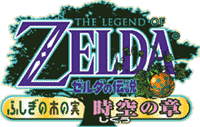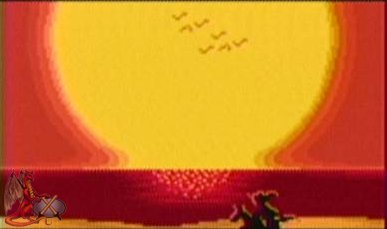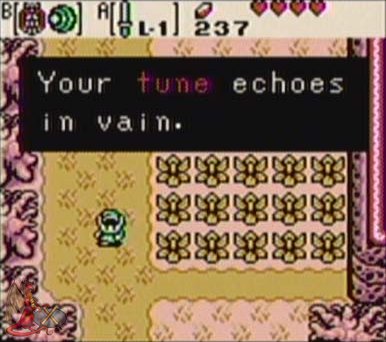|
|

|
BATTLE SYSTEM
|

|
INTERACTION
|

|
ORIGINALITY
|

|
STORY
|

|
MUSIC & SOUND
|

|
VISUALS
|

|
CHALLENGE
|
Moderate
|
COMPLETION TIME
|
6 to 12 Hours
|
|
OVERALL
2.5/5
|
Rating definitions
|
|
|
Back in 2001, the Game Boy Advance was well on its way to the top of the handheld pantheon, and the Game Boy Color's reign was winding down. This did not, however, stop Nintendo from farming out a couple of Zelda titles for the dying handheld to Capcom, master of excessive serialization. And excessive serialization is surely what The Legend of Zelda: Oracle of Ages qualifies as, because while a review should not be a comparison of one game to another, escaping a contrasting view of Oracle of Ages and Oracle of Seasons is hard to do, especially in view of the fact that Seasons comes off as the more polished product. It is difficult to say exactly why this is; the games share much of the same content, from the mechanics to the version of Hyrule (well, Labrynna) du jour to graphics. In the end, though, Oracle of Ages just comes off as being less fun than its brother, mostly because of its excessive reliance on puzzles versus good, old-fashioned Zelda hack-n-slash.
So the Link of the day in Oracle of Ages is wandering through the woods one day when lo and behold, the Oracle of Ages, Nayru, is whisked off by a dastardly sorceress of doom named Veran. That's about all Capcom offers in the way of plot, but Zelda games have never troubled to go overboard in this department, and true to form pretty soon Link is wandering around slicing stuff up with his trusty sword. The big difference between Oracle of Ages and all previous Zelda titles is the fact that Link can unequip the sword if he so chooses in favour of a second "B" item. This comes into play in several areas, where puzzle completion relies on equipping two items, such as the seed shooter and the jump feather. Sadly, it's not a great element; often, it feels clumsy switching the sword out, and woe betide the gamer who forgets to put the sword back in Link's hand before some baddies show up. It is what it is, however, and overall it's not a terrible system. The items are mostly retreads, with the exception of the seeds, and even these have effective analogue items in previous Zelda titles.
Oracle of Ages sounds okay, for a Game Boy Color title. The classic Zelda theme is much in evidence, and the various dungeons all receive mostly tuneless, spooky-esque themes. There's really not much that can be expected from an eight-bit system in this regard, so there is little else to say other than the music does its job adequately. The overall presentation is helped by the fact that the graphics are pretty good for such an ancient handheld. There are few GBC titles that look better than either Oracle of Ages or Oracle of Seasons, and while this is not really high praise in view of the system's limited capabilities, it is nonetheless well done.
 Link's fantastic new weapon, the hydrogen bomb
Link's fantastic new weapon, the hydrogen bomb
|
|
As previously mentioned, Oracle of Ages relies heavily on puzzle-solving to make up the meat of its gameplay. This can cause a certain degree of frustration, as often the solutions to various problems are not readily obvious, and can require switching to two items and leaving Link defenseless. Fighting monsters is also somewhat difficult, as in order to deflect ranged weapons Link must have one of his precious item slots occupied by the shield. Still, Oracle of Ages is by no means of epic length; most gamers should be able to put it away in under ten hours, though those who are truly dedicated to the cultivation of Deku seeds and trading of rings in the game's Advance huts, usable only on link-cable-equipped GBAs, can push the total time higher than that.
In terms of gamer interaction, Oracle of Ages could use a certain degree of fine-tuning. While the inventory system is simplistic, it is, once again, annoying to have to switch items with the frequency required by the game, and the controls aren't quite as tight as those that most Zelda games feature. The translation, meanwhile, is minimalist and bland, as befits a game whose total dialogue could probably fit on three sheets of 8.5x11 paper.
 Capcom ends the falling tree in the woods debate once and for all
Capcom ends the falling tree in the woods debate once and for all
|
|
Oracle of Ages is also not terribly original; Link has done the time travel thing many times, and the means by which he achieves it in this instance is not terribly awe-inspiring. The story is also nothing to write home about, as previously mentioned, and there is never any doubt as to how things will progress. As with most Zelda titles, however, this shouldn't be held against the game overall, as story is hardly central to enjoyability.
So in the end, Oracle of Ages is a mishmash of elements that are all done better in other Zelda games. It's not a complete waste of time, but neither is it particularly worth seeking out on its own merits. Basically the only reason to play it is to gain the perspective to see how much better Oracle of Seasons is.
Review Archives
|









